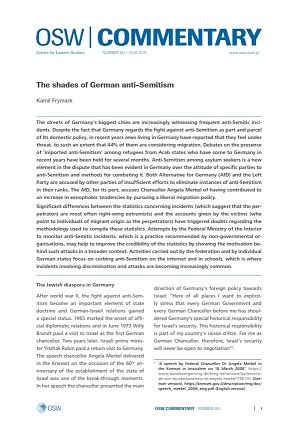The shades of German anti-Semitism
The shades of German anti-Semitism
Author(s): Kamil Frymark
Contributor(s): Magdalena Klimowicz (Translator)
Subject(s): Civil Society, Government/Political systems, Political behavior, Politics and society, Social differentiation, History of Antisemitism, Migration Studies, Sociology of Politics
Published by: OSW Ośrodek Studiów Wschodnich im. Marka Karpia
Keywords: Germany; German cities; anti-Semitism; Jews in Germany; migration of Jews; right-wing extremists; discrimination;
Summary/Abstract: The streets of Germany’s biggest cities are increasingly witnessing frequent anti-Semitic incidents. Despite the fact that Germany regards the fight against anti-Semitism as part and parcel of its domestic policy, in recent years Jews living in Germany have reported that they feel under threat, to such an extent that 44% of them are considering migration. Debates on the presence of ‘imported anti-Semitism’ among refugees from Arab states who have come to Germany in recent years have been held for several months. Anti-Semitism among asylum seekers is a new element in the dispute that has been evident in Germany over the attitude of specific parties to anti-Semitism and methods for combating it. Both Alternative for Germany (AfD) and the Left Party are accused by other parties of insufficient efforts to eliminate instances of anti-Semitism in their ranks. The AfD, for its part, accuses Chancellor Angela Merkel of having contributed to an increase in xenophobic tendencies by pursuing a liberal migration policy. Significant differences between the statistics concerning incidents (which suggest that the perpetrators are most often right-wing extremists) and the accounts given by the victims (who point to individuals of migrant origin as the perpetrators) have triggered doubts regarding the methodology used to compile these statistics. Attempts by the Federal Ministry of the Interior to monitor anti-Semitic incidents, which is a practice recommended by non-governmental organisations, may help to improve the credibility of the statistics by showing the motivation behind such attacks in a broader context. Activities carried out by the federation and by individual German states focus on curbing anti-Semitism on the internet and in schools, which is where incidents involving discrimination and attacks are becoming increasingly common.
Series: OSW Commentary
- Page Count: 11
- Publication Year: 2019
- Language: English
- Content File-PDF

